Parkinson's Disease & Movement Disorders
In The News
Experto de EE.UU. elogia preparación de médicos cubanos
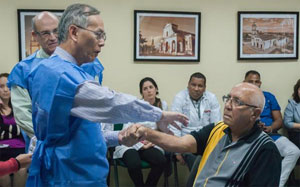
Creado el Viernes, 17 Marzo 2017 19:59 | Iris de Armas Padrino| Foto: Diana Inés Rodríguez/ACN
La Habana, 17 mar (ACN) El doctor Daniel Truong, de Estados Unidos, Presidente de la Sociedad Internacional de Parkinson y enfermedades relacionadas, consideró hoy en esta capital de impresionante la calificación de los profesionales de la salud cubanos, de quienes dijo son muy inteligentes.
Truong, quien participó en el Curso sobre Trastornos del Movimiento y un Taller de Toxina Botulínica, efectuado durante dos días en el Centro Internacional de Restauración Neurológica (CIREN) comentó en exclusiva a la Agencia Cubana de Noticias que esos galenos aprenden muy rápido y “ son increíbles”.
Luego de manifestar el deseo de volver a la mayor de las Antillas, después de esta -su primera experiencia-, el renombrado experto expresó: “estoy impresionado con el trabajo que realizan en esta institución, y los especialistas tienen muchos deseos de aprender.
En el mundo un tres por ciento de la población tiene Parkinson, aseveró el también autor de un libro sobre la Toxina Botulínica, medicamento empleado en el CIREN a un grupo de pacientes que padecen diferentes dolencias neurológicas, con muy buenos resultados.
El doctor Carlos Singer, profesor de neurología de la Universidad de Miami, fue otro de los expertos foráneos que encabezaron el Curso de Trastornos del Movimiento y el Taller de Toxina Botulínica, en los cuales participaron más de un centenar de neurólogos, fisiatras, neurocirujanos, clínicos, investigadores básicos, logopedas, rehabilitadores y enfermeras entre otros cubanos.
Ese curso se realizó con el objetivo de hacer una actualización de la enfermedad de Parkinson, la Estimulación Cerebral Profunda en los Trastornos del Movimiento y las Distonías.
Mientras, el taller hizo una actualización teórica sobre la Toxina Botulínica y sus usos, como la aplicación práctica del medicamento en los diagnósticos relacionados a los trastornos del movimiento.
Como parte del Taller, Truong y Singer aplicaron la Toxina Botulínica a un grupo de pacientes cubanos tratados en el CIREN anteriormente con ese fármaco, quienes manifestaron sentir mejoría.
Ese fármaco es de los laboratorios MERZ Pharmaceuticals GMBH de Alemania, firma radicada en Representaciones Platino S.A. nuestro agente en Cuba, dijo a la ACN Normita Diez, gerente médico de esa empresa que comercializa una línea de productos para enfermedades neurológicas y otros padecimientos.
La doctora Tania Margarita Cruz Hernández, directora del CIREN, explicó que esa institución ha atendido, con enfoques novedosos y reconocido éxito, a más de 140 mil pacientes procedentes de casi un centenar de países de todos los continentes, desde su fundación el 26 de febrero de 1989.
Surgeon becomes a patient in trial for Parkinson's
By Susan Christian Goulding
Dr. James Moore,71, says a pumpthat delivers drugs evenly has changed his life.
Orthopedic surgeon James Moore made a career out of repairing shattered people. "He had patients who broke nearly every bone in a terrible motorcycle accident," said his wife, neuropsychiatrist Stephanie Moore. "He would put them back together like a jigsaw puzzle." Now it was James Moore's turn to need a guardian angel. The symptoms of Parkinson's disease – a debilitating neurological condition – had progressed to the point that, in his words, "I wasn't depressed but I wasn't happy." His oral medication regimen just wasn't working well enough for him to enjoy his usual activities. People with Parkinson's experience poor mobility, muscular rigidity and excessive involuntary movements. The degenerative disease can be managed but not cured. Deciding to give a new specialist a try, James Moore ended up at the office of Dr. Daniel Truong, founder and medical director of The Parkinson's and Movement Disorder Institute at Orange Coast Memorial Medical Center in Fountain Valley. "He saved my life," James Moore said. In 2012, Truong invited James Moore, of Huntington Beach, to take part in a trial of DUOPA enteral suspension – a drug therapy used in Europe and under consideration for approval by the U.S. Food and Drug Administration. After reviewing the results of the study, the FDA approved the therapy this year. "Because it requires an invasive procedure, this therapy is only for patients with advanced Parkinson's disease who aren't improving enough with (oral) medication," said Truong, a clinical investigator in the trial. DUOPA works by delivering the drugs carbidopa and levodopa, which calm the symptoms of Parkinson's, directly into the small intestine through a tube connected to an external pump. By administering medication continually while the patient is awake – for about 16 hours a day – the pump levels out the fluctuations that can occur with oral medication taken in doses every few hours.
How to Eat Healthier by Tricking Your Brain
By Charlotte Hilton Andersen
Remember what you had for breakfast this morning? Congratulations, that simple thought just helped keep your weight in check today! (That was the easiest diet tip ever, right?) According to a new study done by the University of Oxford, people who actively recall the last thing they ate before a meal eat less during the meal. The researchers found that people with dementia would eat a full meal even after just having finished one, not because they were physically hungry but because they couldn't remember eating. They concluded that remembering your previous food helps cue your body's hunger signals. (For more healthy eating hacks, download the latest special edition of our digital magazine—free!)
Surprised that something so simple can have such a big impact on how we eat? Don't be, saysDaniel Truong, M.D., neurologist and medical director at Orange Coast Memorial Medical Center in Fountain Valley, CA. "People think that if you feel hungry you must be hungry, that it's all just biology and hormones, but your mind is really in charge," he says. "Thanks to millions of years of evolution, food and memory are linked for survival. Your memory drives eating and can override both hormones and instinct."
To help you use your brain power to control your willpower, Truong offers four more mind control tricks to make you the ultimate diet Jedi:

1 - Out of Sight, Out of Mind
You caved at the store and bought chocolate, but you haven't lost the battle just yet: Keeping treats out of sight is the best way to avoid overindulging, says Truong. Studies have shown that seeing an ad for a mouthwatering treat can make your mouth water in anticipation of eating it. Short-circuit that instinct by keeping your goodies in a place you won't see them every day. (Find out how to Fight Food Cravings Without Going Crazy)

2 - Stick to One Flavor
Sometimes you just don't care about all the reasons not to, you just want to eat that treat. In this situation, Truong recommends simply keeping your favorite (and only your favorite) snack handy, saying that you're less likely to overindulge if only one flavor is available. "There's a phenomenon called flavor adaptation. If you continue to eat the same food, eventually you won't want it as much. Humans love variety, so the more textures and tastes you have available, the more your mind want to try it all."

3 - Get Excited
You might think that being really amped up to eat would make you inhale everything in sight, but Truong says we actually eat a lot more when we're emotional. "When we get really happy or excited, our brains release the neurochemical dopamine, which makes you feel good and also has the effect of suppressing your appetite." In addition to eating food you enjoy, he recommends creating an atmosphere similar to your favorite restaurant. Making eating a pleasureable experience will help make it more memorable! (Start with these 10 Recipes Tastier Than Takeout Food)

4 - Change Your Memories
One too many ice cream bars in a night may lead you to swear them off forever, thanks to the powerful effect of learned food aversions. "A lot of our enjoyment of eating is related to the experience of eating that food," he explains. "If we associate a particular food with making us feel badly, we don't want to eat it anymore." So instead of focusing on double-chocolate brownies as a forbidden food, try remembering how sick you feel after eating half a pan. You can also use this in reverse by remembering how strong you feel when you eat a veggie-packed salad.
IAPRD and PSN Join Hands: First Movement Disorder Course and Botox Workshop
From World Neurology Online
By Abdul Malik, MBBS, DCN, MD
The specialty of neurology shows remarkable growth in last decade in Pakistan. The 21st meeting of the Pakistan Society of Neurology (PSN) was organized in collaboration with the International Association of Parkinson's and Related Disorders (IAPRD) March 28-30 in Karachi, Pakistan.
There were eight scientific sessions and a half-day Botox Hands-On Workshop in this conference. The speakers from Netherlands, the United States, Saudi Arabia and Pakistan shared their experiences pertaining to neurology. The core of the discussion was the advances in movement disorders and the newer therapies now emerging. The guest faculty from the IAPRD had given a detailed overview on the topic.
BRAIN MATTERS - "THE MIRACLE WORKER" - Dr. Daniel Truong
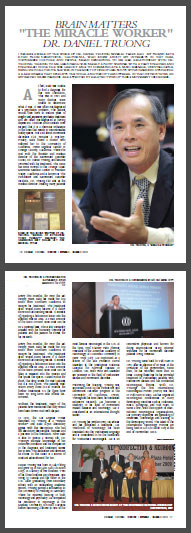 I became aware of the work of Dr. Daniel Truong several years ago. My friend Catherine N. from Northern California, who knew about my interests in Viet Nam,
Vietnamese culture and people, began describing to me her relationship with Dr. Truong.
I became aware of the work of Dr. Daniel Truong several years ago. My friend Catherine N. from Northern California, who knew about my interests in Viet Nam,
Vietnamese culture and people, began describing to me her relationship with Dr. Truong.
Talking to me, her speech was barely a faint whisper with a very strained and strangled voice. She was hardly able to communicate a basic message, unintelligible, being virtually mute. She was in the midst of one of her bouts with spasmodic dysphonia.
A rare disease that disrupts the vocal abilities of the sufferer. In the United States, an estimated 100,000 persons are affected by related types of these movement disorders.
At first, she was unable to find a diagnosis for this rare condition. This was in 1991 and many doctors were unable to determine what it was. It was often misdiagnosed as a psychiatric problem. The patient would then have to endure years of lengthy and expensive psychiatric treatment and are often misdiagnosed as having depression. Doctors and scientists now suspect that it is a chemical imbalance in the brain that results in uncontrollable bodily spasms. But a lot about movement disorders still remains a mystery. Finally, she found a doctor who referred her to the University of California, Irvine Medical Center in Orange County, California. There she met with the founder and medical director of the Movement Disorder Clinic, Dr. Daniel Truong, and became involved with his treatment.
The clinic has since moved to the Orange Coast Memorial Medical Center in Fountain Valley, California and is known as The Parkinson's and Movement Disorder Institute. Dr. Truong still acts as the medical director, treating many patients on a personal basis. She is still constantly amazed with his humanity towards his patients and the passion he shows for his research.
Every five months, for over the last twenty years, she has made her trip south from Northern California to receive his treatment. The treatment itself would seem bizarre if it didn't show such astounding results. It consists of injecting a botulinum toxin into the affected muscle area. A small amount of the toxin (around 3000 units can be fatal) is released into the muscle and this quiets the spasm. Called Botox for short, this drug works for most patients but it is not a cure. The patients must return every three to six months for further treatments. So far there have been no long-term side effects discovered. Without the treatment, many of the patients have mentioned that they would have been driven mad with despair.
In 1991, the Los Angeles Times described Dr. Truong as a "miracle worker" and she absolutely agrees with this description. She had felt absolutely despondent, helpless and a prisoner to the condition. Now she is able to pursue a normal life. Dr. Truong's intimate knowledge of her unknown condition and his compassion in the diagnosis and treatment leaves her in awe. The dedication and devotion he shows to this cause is a source of constant astonishment for her.
Daniel Truong was born in Hai Phong and grew up in Sai Gon (Ho Chi Minh City), in a family of five children. Two of his three brothers are physicians, one living in Canada and the other in the U.S. After graduating from secondary school with an outstanding academic record, Truong earned a scholarship to the University of Freiburg in Germany. There he received training in both neurology and psychiatry. He completed his residency in neurology at the Medical University of South Carolina before becoming a fellow to one of the most famous neurologist in the U.S. at the time, Prof. Stanley Fahn (former President of the American Academy of Neurology) at Columbia University in New York City. He continued as a fellow of the late Professor David Marsden at the prestigious National Hospital for Nervous Disease in London, UK. Both Fahn and Marsden are pioneers in the field of Parkinson's disease and movement disorders
Following this training, Truong was appointed to set up the Parkinson's and Movement Disorder program at the University of California, Irvine. Throughout his time there, he conducted extensive research. He becomes a celebrity in his field of movement related diseases and neurology. He is considered as an international thought leader.
Dr. Truong has written over 120 articles and has published 6 textbooks. His Textbook of Neurology has been translated into the Vietnamese language and is considered to be the handbook for Vietnamese neurologists. He is an innovative physician and known for doing examinations using internet webcams for his movement disorder patients living overseas.
Dr. Truong came back to Viet Nam in 1991 after an absence of 23 years, at the invitation of the government. Since then, he has returned more than 20 times. During these trips he has provided treatment to Vietnamese patients with Parkinson's disease and has conducted neurological forums. With Dr. Truong's the first International Neurological Forum (INFO) was held in Viet Nam in 2004. He has organized neurological conferences in many developing countries such as Indonesia, Brazil, Mongolia, and Viet Nam, to name a few, with the support of international neurological organizations. His primary objectives are spreading of awareness, knowledge and training to the developing world. The latest of the International Neurology Forums are being held in Ho Chi Minh City at the end of November, 2010.
Jon Anderholm
Improving movement, changing lives
Sources: ORANGE COAST MEMORIAL • FALL 2010 • Newsletters
Dave Jones was just 11 years old when his left foot began to twist painfully inward.
His parents thought the problem was caused by skateboarding - their son’s favorite sport. But when Dave’s foot didn’t improve with rest, the Jones family embarked on a search for answers.
Now in his 30s, Dave saw a series of specialists over the next few years, but they failed to diagnose his problem. The Placentia resident also underwent several unnecessary foot surgeries.
Meanwhile, his condition grew worse. His left foot became permanently fixed in an abnormal position, which prevented him from putting his heel on the ground and walking normally.
The Right Diagnosis
Finally, Dave had a stroke of luck! He was referred to Daniel Truong, M.D., an internationally known neurologist and movement disorders specialist at the Parkinson’s and Movement Disorder Institute at Orange Coast Memorial. “Dr. Truong diagnosed me immediately,” Dave says. “It turned out my problem was a movement disorder called dystonia.”
A “Brain Pacemaker”
“People with dystonia experience involuntary muscle contractions that twist the body into painful postures,” says Dr. Truong, author of the recently published book, “Living Well With Dystonia.” “Although there is no cure, symptoms can often be controlled with medications and other treatments.”
In Dave’s case, dystonia medications were nothing short of miraculous, sending his disease into almost complete remission. But seven years ago, the drugs stopped working, and Dave’s symptoms quickly grew worse. Soon, the vital young man, then in his 20s, was confined to a wheelchair. That’s when Dr. Truong suggested that Dave consider a procedure called deep brain stimulation (DBS), which has been used to treat movement disorders such as essential tremor and Parkinson’s disease since the mid - 1990s. Used for dystonia since 2003, DBS uses surgically implanted electrodes to regulate abnormal activity in the part of the brain that controls muscle contractions.
“Think of DBS as a ‘brain pacemaker,’” says Devin K. Binder, M.D., Ph.D., a fellowshiptrained neurosurgeon at Orange Coast Memorial and leading authority on DBS. “Electrodes placed deep in the brain are connected to a battery-operated generator, which is implanted under the collarbone, just like a pacemaker for the heart. The generator is individually adjusted for each patient to achieve the best control of symptoms. DBS isn’t a cure for dystonia and other movement disorders, but for many patients, it can improve life dramatically.”
Dave’s surgery took place in late 2005. Assisted by MRI scans and brain-mapping technology, the surgical team located the area in the brain creating his symptoms. After the electrode was threaded into the right location, Dave was awakened and asked to perform various tasks to ensure that the electrode was placed correctly. A few days later, in a separate procedure, the generator was positioned under his collarbone.
Often, it takes time to find the best settings for each patient. But as Dave tells it, “They turned on the battery and bam! I was walking down the hallway. I was ready to go hiking. All of a sudden, I’m out here in this new world, this new life.” The adjustment to that new life hasn’t always been easy, but Dave has no regrets. “Everything changed the day I met Dr. Truong. No one has ever treated me like he has. He’s the best I’ve ever met. I’ve been in his care for 20 years, and he’s kept me going.”
For more information about DBS at Orange Coast Memorial, call 1-800-MEMORIAL.
Dystonia's Miracle Worker
Dr. Daniel Truong of UCI Medical Center's movement disorder clinic gives his patients freedom by treating them with botulinum toxin.
October 16, 1991 | SUSAN PATERNO, SPECIAL TO THE TIMES
ORANGE — Ruth Deadmon, a near mute, waits outside the office of Dr. Daniel Truong, desperately hoping her voice can be restored. Deadmon is typical of Truong's patients: She awoke one day with what she thought was laryngitis. It has lasted seven years. Deadmon's condition has become so severe she sometimes cannot eat. She no longer answers her phone. After seeing dozens of doctors and several psychiatrists, Deadmon was told she had spasmodic dysphonia, one of a range of rare neurological movement disorders called dystonia.
"He's her last hope," Deadmon's daughter says as the two wait for Truong.
Roughly 100,000 people nationwide suffer from a related type of movement disorder, and until recently there was no effective way to diagnose or treat it.
But Truong, founder of UCI Medical Center's year-old movement disorder clinic, is one of a handful of doctors around the country successfully treating spasmodic dysphonia by injecting minute amounts of botulinum toxin, the same deadly compound responsible for food poisoning, into the spasmodic muscle. The drug temporarily deadens the muscle and quiets the spasm.
The toxin, marketed for the first time by Irvine-based Allergan, is being used to treat disorders affecting everything from writer's cramp to muscle rigidity so severe some people feel as though a sadistic puppeteer were controlling them.
Called botox for short, botulinum toxin varies in its effectiveness and comes with a high price tag: about $900 per course of treatment. Most users find some relief fairly quickly, Truong says.
"We call him 'Truong Man.' He's a super-hero to us," says Susan Becraft, one of Truong's patients. Truong has successfully treated Becraft for spasmodic torticollis, a movement disorder of the neck.
Becraft first noticed something wrong when her head tipped uncontrollably as she drove. The condition worsened. "I felt as though there was a little man on my nose with a string attached to my neck and he was jerking that string as hard as he could to the left. And I just wasn't strong enough to pull it back."
Other patients tell the same story. Patty Johnson, a Dana Point resident and personnel assistant for the Capistrano Unified School District, went to Truong after her lips uncontrollably puckered, frozen in the shape of a carp's mouth.
Today, after botox treatments, Johnson says she believes she is cured.
Barbara Rood, a receptionist at a local college, described regaining her voice after two years "like emerging from a dark pit. I imagine it's like a blind person seeing again."
Click here to read full article
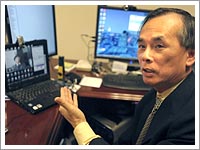 Doctor helps patients across world via webcam
Doctor helps patients across world via webcam
By DEEPA BHARATH - The Orange County Register.
FOUNTAIN VALLEY Thanh An, a 76-year-old Vietnamese filmmaker, is sitting in his home in North Vietnam. It's close to midnight in that country, but he is awake and seated in front of a Web camera, waiting for his consultation with Dr. Daniel Truong, neurologist at Orange Coast Memorial Medical Center. For the past two years, Truong has performed consultations over the Internet for several Parkinson's patients in Vietnam and Mongolia, using the Web camera technology and Internet chat programs such as Skype
Click Here to read full article
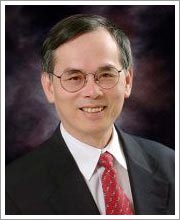 Meet Your Neighbor: Parkinson's doctor Daniel Truong
Meet Your Neighbor: Parkinson's doctor Daniel Truong
By By EVA KILGORE - The Orange County Register.
Dr. Daniel Truong is the founder of the American Parkinson Disease Association Information & Referral Center in Fountain Valley. People who have Parkinson's can have symptoms that include tremors, slowness of movement and difficulty walking or completing simple tasks.
I sat down with Truong to talk about how the center works and what is being done in the area of research for Parkinson's.
Click Here to read full article
Mission Statement
Foremost, the physicians, research scientists and staff at the Parkinson's and Movement Disorders Institute all share the common goal of providing superior care to our patients in the treatment of neurological disorders affecting movement. It is our belief that people who must cope with symptoms or illness have enhanced quality of life when they understand their diagnosis and treatment plan, and when they are informed and active participants in their own health care.
We also know that we learn and improve as physicians from our experiences with all of our patients. In our clinical practice we encourage a relationship of open communication between patient and physician.
read more about PMDI...
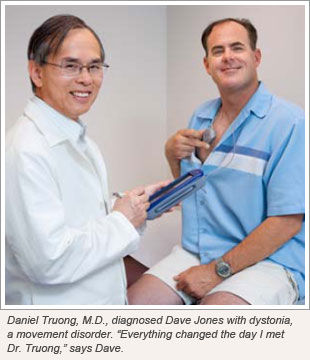 Deep Brain Stimulation
Deep Brain Stimulation